Presidents 1 - 3
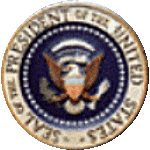

George Washington
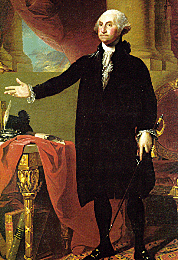
In July of 1755, a force of French and Indian soldiers
launched a surprise attack against a British army in the Ohio Valley. Almost
half of the British force was killed or wounded. When the British General
Edward Braddock was killed, his aide George Washington performed heroically.
Washington took charge of the forces, leading the survivors on an orderly
retreat back to Virginia. He later reported that he had "escaped without
a wound, although I had four bullets through my coat."
The French and Indian War was the school in which George Washington learned
the art of war. Years later, when leading the colonial armies during the
American Revolution, Washington often would be defeated. But he always managed
to preserve the Continental Army to fight again.
George Washington was born in Virginia, the son of wealthy planters. As a
young man, he studied and worked as a surveyor. When his half-brother Lawrence
died, Washington inherited the family plantation, Mount Vernon, and began a
career as a gentleman farmer. He fought in the French and Indian War as a
member of Virginia's militia, and resigned in 1758 after he was elected to
Virginia's House of Burgesses. In March of 1759 Washington married Martha
Custis.
Washington was elected a delegate to the First and to the Second Continental
Congress. After war broke out at Lexington and Concord, John Adams nominated
Washington to be head of the Continental Army: "I [have] in my mind for
that important command . . . a gentleman whose skill and experience as an
officer, whose independent fortune, great talents, and excellent universal
character would command the [approval] of all America."
Washington's integrity and dignity inspired trust from the people of the
country, and the congressional delegates unanimously approved him as army
commander. Although not a military genius, he was a man of great determination
and will. And he proved to be a natural leader.
Washington always kept the Continental Army from being destroyed, even when it
had more defeats than victories. Its lowest point occurred during the winter
of 1777-1778, when the army was camped at Valley Forge, Pennsylvania. The
soldiers were under-clothed, underfed, and underpaid -- yet, Washington's
leadership held them together.
Always alert for a military opportunity, Washington clearly spotted one in
1781. Joining forces with a French fleet, Washington and his soldiers trapped
a British army at Yorktown. The surrender of the British commander, General
Charles Cornwallis, ended the war.
With peace finally in sight, Washington resigned from the army. He hoped to
enjoy his retirement at Mount Vernon. But when Virginia elected its delegates
to the Constitutional Convention in 1787, Washington was persuaded to go. When
the electoral college voted on a first President to lead the new American
nation, Washington was the unanimous choice.
Washington was keenly aware that his actions as the first President would set
an example for Presidents who would succeed him. He always was thoughtful
about his words and actions in public office. Even in symbolic matters, he
tried to set the proper tone. When Congress debated how to address the
President, Washington announced that he preferred "President of the
United States" to more exalted titles like "His Elective
Highness."
Washington chose the most talented people he could find for his Cabinet. He
asked Thomas Jefferson to be Secretary of State and appointed Alexander
Hamilton Secretary of the Treasury. Hamilton was an intelligent but
controversial Secretary. Jefferson and James Madison objected to Hamilton's
plans for raising taxes and creating a national bank. But Washington agreed
with Hamilton. Together they helped get the new nation's economy off to a good
start.
Washington was not afraid to use the President's power when necessary. In
1794, when farmers in western Pennsylvania refused to pay a tax on whiskey,
Washington called up the militia. This prompt response ended the Whiskey
Rebellion and showed that the federal government had the power to enforce its
laws.
Washington was elected to two terms as President, but refused a third term.
This set a precedent followed by every President until Franklin Roosevelt. In
his farewell address, Washington advised Americans against getting involved in
European alliances that could drag the United States into war. That advice
guided American foreign policy for many years. Washington also advised against
the formation of political parties, but Americans did not follow that
suggestion.
Washington retired to Mount Vernon in 1797, but lived for only another two
years. When "the Father of His Country" died on December 14, 1799,
the whole nation mourned. The man who had led the United States to victory in
the Revolution and guided the nation in its infancy was gone, but neither he
nor his accomplishments would ever be forgotten.
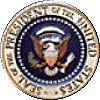
John Adams
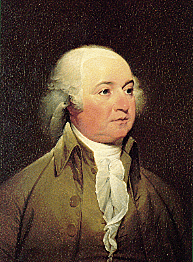
When lawyer John Adams defended the British soldiers
accused of the Boston Massacre, his fellow Bostonians were shocked. But Adams
said he took the case because he believed the soldiers had been provoked by a
mob. They were only obeying orders, he said. To John Adams, justice was
obviously more important than popularity.
Born in Braintree (present-day Quincy), Massachusetts, Adams attended Harvard
College and set up a law practice in his hometown. He married lively Abigail
Smith in 1764. Their partnership provided Adams with good advice and
intelligent and witty conversation.
Adams was devoted to his wife, family, and friends, but was often reserved or
cold with strangers. Sensitive to criticism and prone to depression, Adams did
not have the ideal personality for public life. But his ambition and
patriotism drove him into politics.
Massachusetts voted Adams a delegate to the Continental Congress in 1774.
There he worked hard to move the Congress toward independence. Although Adams
was assigned to the committee to draft a Declaration of Independence, he
thought that Thomas Jefferson was a better writer. Adams left the actual
writing to his friend and colleague.
During the Revolution, Adams represented the new nation in Europe. In 1783,
together with Benjamin Franklin and John Jay, he helped negotiate the Treaty
of Paris. The treaty ended the war with Great Britain and formally recognized
American independence. Shortly thereafter, Adams was appointed the first
ambassador to England from the United States.
Adams served as the new nation's first Vice President during George
Washington's term as President, but he did not like the position. He called it
"the most insignificant office that ever the invention of man
contrived." When Washington refused a third term in office, Adams was
elected the second President of the United States in 1796. His longtime friend
Thomas Jefferson became his Vice President, and he kept most of Washington's
Cabinet members in place.
The ongoing wars between England and France troubled Adams' presidency. Many
members of his own Federalist party and the Cabinet wanted the United States
to side with England against France. But Adams wanted peace, and pursued a
policy of neutrality. Because of this stance, he lost much support within his
own party.
The division within the Federalist party and Adams's failing popularity with
the American people caused him to lose the presidential election to Republican
Thomas Jefferson. But Adams never regretted pursuing peace. He requested that
his tombstone be inscribed with: "Here lies John Adams, who took upon
himself the responsibility of the peace with France in the year 1800."
Adams died at age 90 on the Fourth of July, 1826. His last words were
"Jefferson still survives." But his old friend had actually died on
the same day, several hours earlier.

Thomas Jefferson
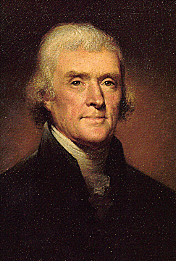
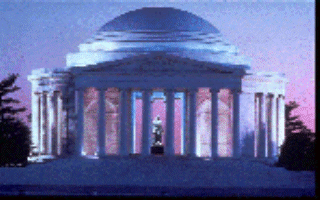
When Thomas Jefferson presented his draft of the
Declaration of Independence to the Continental Congress in June of 1776, he
was aware that the ideas in it were not new. Jefferson had learned many of the
democratic principles expressed in the document from the writings of
Englishman John Locke and other philosophers. Now he endowed them with a
uniquely American flavor. Jefferson later wrote that he tried "to place
before mankind the common sense of the subject, in terms so plain and firm as
to command their assent, and to justify ourselves in the independent stand we
are compelled to take."
Thomas Jefferson was born in Goochland (present-day Albemarle) County,
Virginia, the son of a wealthy landowner and planter. He received a fine
education at the College of William and Mary, and was the most scholarly of
all the founding fathers. Jefferson could read French, Latin, and Greek. He
was an architect, inventor, naturalist, writer, lawyer, and diplomat as well
as a politician and statesman.
Jefferson's love of music and violin playing helped him woo and win Martha
Skelton, a young Williamsburg widow. They were married on January 1, 1772. The
couple lived at Monticello, the Virginia home that Jefferson had designed and
was in the process of building. Jefferson would continue to improve and
remodel Monticello throughout his entire life.
Jefferson believed that his natural inclination was towards science, but that
certain events carried him into politics. He was elected to the Virginia House
of Burgesses, and then to the Continental Congress, where he quickly was
appointed to the committee for drafting a Declaration of Independence.
Although John Adams and Benjamin Franklin were more prominent members of the
committee than Jefferson, Adams wanted Jefferson to write the draft of the
Declaration. He felt that having a Virginian pen the document would help
convince southern delegates to vote for it. He also knew that Jefferson was a
better writer. Although Jefferson's draft was amended before it was passed
(and his attack on the slave trade deleted), he had put his indelible stamp on
the birth of the American nation.
During the Revolution, Jefferson served as a member of Virginia's House of
Delegates, and he wrote the state's Statute of Religious Freedom. Although
Rhode Island had been the first colony to guarantee religious freedom,
Virginia was the first state in the new nation to pass such a law.
Jefferson was appointed ambassador to France in 1785. When he returned to the
United States in 1790, George Washington made him the nation's first Secretary
of State. Although Jefferson had great respect for George Washington, he was
in constant conflict with Washington's Secretary of the Treasury, Alexander
Hamilton. Hamilton wanted a strong federal government guided by powerful,
educated men. Jefferson believed more political power should belong to the
states and to ordinary citizens. Hamilton and his supporters created the
Federalist party, while Jefferson and his friends formed the Democratic-
Republicans.
Although George Washington did not favor political parties, he came to agree
more with Hamilton's views than with Jefferson's. Growing increasingly
uncomfortable as a member of Washington's Cabinet, Jefferson resigned in 1794.
When Washington decided against a third term as President, Jefferson ran for
the office on the Democratic- Republican ticket. His opponent was his longtime
friend John Adams. The Federalists won the election, and John Adams became
President. Jefferson, who received the second highest number of votes, became
Vice President.
In 1800, Jefferson ran for President against Aaron Burr and the incumbent John
Adams. This time he won the office. Jefferson's greatest achievement as
President was the purchase of the Louisiana Territory from France. In 1803,
Napoleon Bonaparte, needing money to fight his wars, offered to sell the
territory to the United States for $15 million -- a price of about 3 cents an
acre. Jefferson realized that purchasing Louisiana would more than double the
size of the United States. He quickly finalized the deal before Napoleon could
change his mind.
Jefferson hired his private secretary Meriwether Lewis to explore the vast
territory. Lewis recruited his friend William Clark to help lead an expedition
of about 50 men, who not only explored and mapped the land, but also collected
specimens of new plants and animals they found. Lewis and Clark's trek lasted
over two-and-a-half years and covered more than 8,000 miles.
Jefferson was reelected President in 1804, but his second term was plagued by
complications. In the wars between France and Great Britain, British ships
began firing on American ships that couldn't prove their nationality.
Jefferson declared an embargo act that prevented American ships from sailing
to foreign ports. This act hurt American trade and business, and in turn,
Jefferson's popularity.
Jefferson followed Washington's example and decided against a third term in
1808. Retiring to Monticello, he spent much of his time trying to get his
neglected farm to turn a profit. But he had time for other projects as well.
Jefferson founded the University of Virginia at Charlottesville, and he
considered this one of his most important achievements. In fact, when
Jefferson wrote his will, he asked that his tombstone read "Here was
buried Thomas Jefferson, Author of the Declaration of American Independence,
of the Statute of Virginia for Religious Freedom and Father of the University
of Virginia." He did not even mention the presidency.
Jefferson died on July 4, 1826, the 50th anniversary of United States
independence. His old friend John Adams died on the same day.

All images of Presidents are courtesy of whitehouse.gov
Information taken from Software titled "American Heritage The History of
the United States for Young People.
The copyright belongs to: Forbes
Inc. and Byron Press Multimedia Company. Thank You!



|